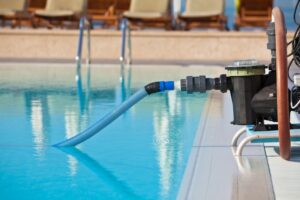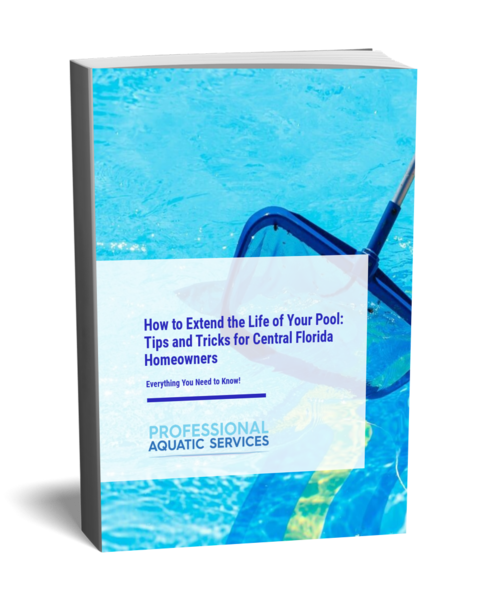When a pool pump stops working—whether due to a power outage, mechanical failure, or postponed maintenance—issues quickly surface. The pump acts as the force behind your circulation system, moving water through filters and keeping everything clean, safe, and chemically balanced. Without it, water sits stagnant, creating the perfect environment for algae, bacteria, and debris buildup.
Even a short period—just a few days—without proper circulation can lead to cloudy water, foul odors, and unsafe swimming conditions. Left untreated, the damage can become costly and time-consuming to fix. This guide walks you through how fast water quality can decline and what to do before it’s too late.
Table of Contents
ToggleWhy Pool Pumps Are Essential for Water Circulation
A pool pump does more than just move water—it keeps your entire pool alive. Without steady circulation, your pool becomes a stagnant mess. Think of the pump as the heart of your pool system, pushing water through the filter, skimmer, and heater to keep everything balanced and clean. It’s what helps prevent chemical imbalances, cloudy water, and those dreaded algae blooms.
When water stands still, bacteria and debris settle fast. That’s when things start to go south. Circulation from the filtration system keeps water moving, making it harder for algae to grow and easier for filters to do their job. Skipping pump time doesn’t just mean dirty water—it means risking your pool’s health. If your filtration setup fails, trouble adds up fast—and so do repair costs.
What’s the Maximum Time a Pool Can Remain Clean Without Its Pump?
If your circulation system suddenly stops running, you don’t have a lot of time before things take a turn. While it might look fine for a day or two, water quality can drop faster than you think. Even if your pool was just cleaned and the water looked crystal clear, still water means trouble is right around the corner. Knowing the signs and acting early can help you avoid bigger headaches.
Timeline of Water Quality Degradation
In most cases, a pool starts to show signs of decline within 24 to 48 hours without proper circulation. On the first day, dirt and small debris begin to settle. By day two or three, chlorine levels drop, making it harder to fight off bacteria. Without your main pump running, the water stops moving through the filter, and contaminants build up quickly.

By day four or five, you may start to see early signs of algae on the walls or floor. Cloudy or green water usually follows. If the weather is hot or rainy, it speeds up the process. A neglected pool can turn into a breeding ground for mosquitoes, bacteria, and other nasty things—all in under a week. And once algae take over, regular pool supplies won’t help—you may need a full cleaning or circulation system repair.
Factors That Affect How Quickly a Pool Deteriorates
Several things affect how long your pool stays clean without a pool motor. First is the age and condition of your pool equipment. Older systems can lose effectiveness faster, especially if they haven’t been maintained well. Then there’s the weather. Pools in hot, humid areas need more circulation to stay balanced. Frequent use, nearby trees, or pets swimming in the pool can also cause faster debris and bacteria buildup.
Your choice of equipment matters, too. Brands like Pentair are known for reliability, but even the best systems can fail without regular checks. That’s why routine care and the right maintenance supplies are key. You want to ensure your system is working well before small issues become big problems.
If your system goes down, don’t wait too long to act. Call for pool pump repair or inspection and get your system back up before the water turns.
Professional Solutions When a Pool Pump Fails
If your water system stalls, don’t ignore it. Acting fast can save you hundreds in repairs. Fortunately, professionals have safe, effective ways to keep your water in check while the main pump is down.
Short-Term Maintenance Services from Pool Technicians
Local pros can manually clean, skim, and vacuum your pool using external circulation tools. These steps help maintain water quality until repairs or replacements are complete.
Safe Chemical Treatments to Control Water Quality
Technicians may apply shock treatments or targeted chemicals to stabilize water temporarily. Since chemicals aren’t circulating, the method and dosage are critical. Letting a pro handle this prevents accidental over-treatment or damage to pool surfaces and components.
When to Replace vs. Repair a Pool Pump
Sometimes, a quick repair—like replacing a motor—is all you need. But if your unit is outdated or breaks down often, a replacement might be the smarter call. A technician can inspect your system, weigh the cost, and help you make the right decision with confidence.
Don’t Let Your Pool Sit Idle
Leaving your pool untouched for too long creates the perfect setup for algae, bacteria, and costly repairs. A broken pool pump or neglected equipment doesn’t just affect water—it impacts the entire system. Taking prompt action saves you money and keeps your water safe.
If your circulation stops, don’t wait. Call a professional who knows what to look for and how to fix it right. At Professional Aquatic Services, trained technicians handle everything from pool pump repair to short-term maintenance and water treatment. Their goal is simple: help you protect your investment and get your pool back in working order without the stress.
FAQs
Most pools start to show signs of water quality decline within 24 to 48 hours of lack of proper circulation. Algae and bacteria may begin to take over by day four or five.
Without circulation, water becomes stagnant, allowing debris, bacteria, and algae to build up quickly. This can lead to cloudy water, foul smells, and unsafe swimming conditions.
Temporarily, yes—but only with manual cleaning and professional chemical treatments. A pool pump is essential for long-term cleanliness and water safety.
No, stagnant water can harbor bacteria and harmful microorganisms. Swimming in an unfiltered pool increases health risks.
If the pump is noisy, leaking, or not moving water effectively, it may need repair. Older or frequently failing systems may be better off being replaced.
Professional technicians can manually clean the pool and apply chemical treatments to keep water safe until the pump is repaired or replaced.
Common issues include motor failure, clogged filters, electrical problems, general wear and tear from age, or poor maintenance.
They may temporarily use shock treatments, algaecides, and external circulation tools to manage water quality.
To catch issues early, it's a good idea to inspect your system weekly and schedule routine maintenance at least once per season.
For expert diagnosis, repairs, and water treatment, contact a licensed pool technician or a trusted local provider like Professional Aquatic Services.

